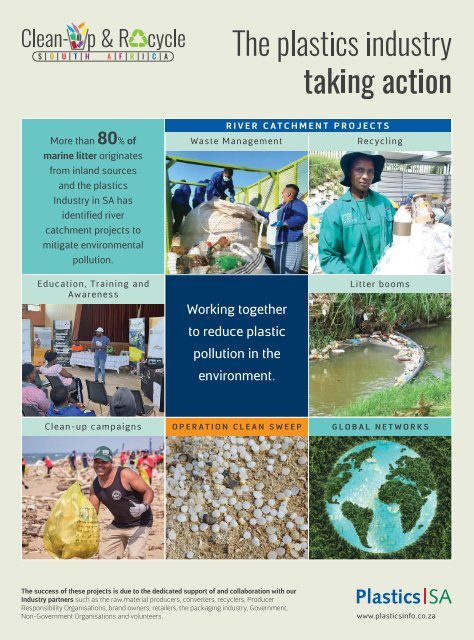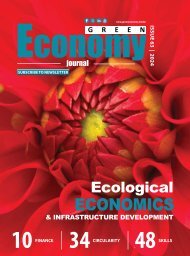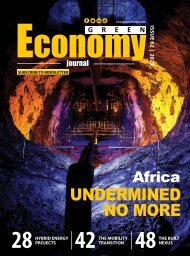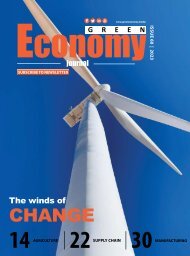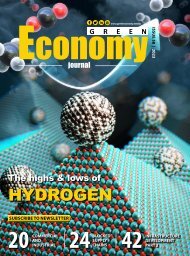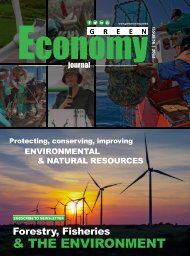Green Economy Journal Issue 61
You also want an ePaper? Increase the reach of your titles
YUMPU automatically turns print PDFs into web optimized ePapers that Google loves.
GLOBAL PLASTICS TREATY<br />
WASTE<br />
talks conclude in Nairobi, Kenya: with key issues unresolved<br />
The recently held International Negotiating Committee on Plastics meetings aimed at crafting a<br />
landmark, legally binding global plastics treaty to combat plastics pollution, with specific reference<br />
to the marine environment, concluded in November 2023, with critical topics left unresolved.<br />
BY PLASTICS SA<br />
Among the key issues left unresolved is the intersessional<br />
work required between the Negotiating Committee on<br />
Plastics (INC3) and the upcoming INC4, scheduled to take<br />
place in April 2024 in Canada. This intersessional work is crucial<br />
for laying the groundwork for more substantive talks at INC4.<br />
INC3 achieved progress by refining the Zero Draft document,<br />
incorporating additional elements necessary to achieve the agreement’s<br />
overarching goal – ending plastic leakage into the environment, with<br />
a particular focus on marine environments. The primary objective is<br />
to establish an equitable and implementable agreement that acts as<br />
a catalyst for plastics circularity, promoting better product design,<br />
reusability and improved waste infrastructure.<br />
Despite this step forward, the negotiations revealed a split between<br />
fossil fuel and resin producers, advocating for design improvements<br />
and recycled materials mandates as well as non-profit groups and<br />
consumer product companies, favouring limits on resin production.<br />
Plastics SA and the Chemical and Allied Industries Association<br />
(CAIA) were active participants in the Nairobi negotiations. Plastics<br />
SA represented the South African plastics industry. They supported<br />
the view held by Global Partners for Plastics Circularity, who<br />
underscored demand-side solutions, such as boosting recycled<br />
content and enhancing waste collection.<br />
Anton Hanekom, executive director of Plastics SA, was part of the<br />
South African delegation who are not supportive of calls made for<br />
a broader treaty, encompassing supply-side solutions like reducing<br />
plastics production and restrictions on “problematic” plastics or<br />
chemicals. “Modern life would be impossible without plastics. It is<br />
short-sighted and irresponsible to push for outright bans without<br />
taking into consideration each country’s socio-economic needs and<br />
unique challenges. It was clear from the emotive talks and appeals<br />
to ban plastics, that many of these advocates are misinformed<br />
about plastics, the ingredients that are used to produce them and<br />
the huge progress we as an industry have made over the last two<br />
decades to create products that are safe, sustainable, responsible<br />
and recyclable.”<br />
Hanekom emphasised the plastics industry’s stance on advocating<br />
for national autonomy when it comes to developing plans to reduce<br />
packaging pollution. He highlighted the need for funding and supportive<br />
policies to unlock waste, especially in regions lacking adequate<br />
infrastructure, as ongoing challenges.<br />
“Nobody likes to see litter in the environment. But the solutions<br />
that we develop to solve this crisis must not end up creating bigger<br />
problems, nor must they end up harming the health and well-being<br />
of our people, the environment or putting thousands of jobs at<br />
risk. However, we are in support of the calls for the development<br />
of chemical management plans, chemical transparency and the<br />
promotion of design for recyclability,” added Deidre Penfold,<br />
executive director of CAIA.<br />
Negotiations concluded with no solid plan, as oil-producing<br />
countries and major plastic manufacturers created ripples of<br />
disagreement. The path forward underscores the complexity of<br />
balancing diverse interests to create an equitable and implementable<br />
global plastics treaty. The unresolved issues underscore the need<br />
for continued collaboration and dedication as the world strives to<br />
address the urgent challenges posed by plastic pollution.<br />
The focus now shifts to the intersessional work and preparations<br />
for INC4, where stakeholders anticipate more robust discussions<br />
and the formulation of concrete steps towards a comprehensive<br />
and impactful global plastics treaty.<br />
For more information, visit www.plasticsinfo.co.za.<br />
47


